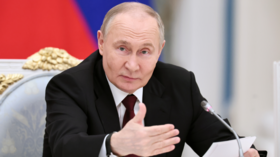Global food crisis gives G8 something to chew on
The global food crisis has been one of the main topics discussed by G8 finance ministers at their meeting in Japan. They blame surging inflation and rising oil and food prices for the uncertainty the world economy is facing. At home, Russians have seen fo
The talks in Osaka are laying the ground for a G8 summit scheduled for July.
By then Russia will have decided how much it will contribute to a global food crisis fund.
The initiative is aimed at helping the poorest nations handle the difficult situation.
Meanwhile, as Russia integrates into the global economy, key sectors like agriculture are vulnerable to the effects of the global market.
The price of milk, together with other food products, has risen by more than 20 per cent since the beginning of this year.
Government support for agriculture was raised at the International Economic Forum in St.Petersburg.
The U.S. and the European Union, which both substantially subsidise their agricultural producers, insist on the benefit of free trade.
“Our challenge as leaders is to build and create new wealth so that everyone can participate in that opportunity, to create opportunity for everyone through education and to prepare our citizens to compete in the world economy,” says U.S. Commerce Secretary Carlos Gutierrez.
Russia, a relative newcomer to the global market economy, supports this view, but Moscow says it's up to America and the European Union, to make sure trade is fair.
The issue will be the focus of the next summit of the Group of Eight industrialised nations in which they will tackle the global food crisis.
The G8 are hoping to find ways of helping countries in need, and supporting agricultural programmes is seen one possible solution.
Although the impact differs from one nation to another, even the world's strongest economies could become vulnerable to food shortages if their leaders fail to find a unified approach to this problem.
Rising food prices are making basic food unaffordable for many people around the globe.
Meanwhile, a survey has found that people in ex-Soviet countries work much longer than their western European counterparts to buy basic goods.
Russian newspaper Novye Izvestia compared three European capitals, London, Stockholm and Berlin, with three post-Soviet capitals, Moscow, Kiev and Astana in Kazakhstan, to examine the price of a typical food basket which included potatoes, carrots, chicken, rice and cola.
It found that Berliners only have to pay $US 6.63 for these goods, while residents of the Swedish capital pay the highest price, around $US 14.50.
The difference between the cheapest and the most expensive cities in food prices is around $US 7.
But while the prices of foodstuffs are comparable, the efforts needed to buy them vary drastically.
Western Europeans have to work less than 20 minutes to earn enough to buy the food basket.
In Moscow, it takes an hour and a half, over an hour and 40 minutes in Kazakhstan, and over 3 hours in the Ukrainian capital, Kiev.











